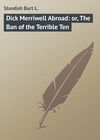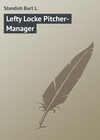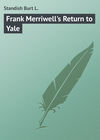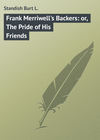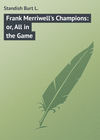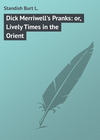Buch lesen: «Dick Merriwell Abroad: or, The Ban of the Terrible Ten», Seite 2
CHAPTER III. – AT BEN CLEUCH INN
The Ben Cleuch Inn at Lochleven was kept by the Widow Myles, a plain, kind, motherly soul, the best part of whose life lay behind her.
The inn stood by the highway that wound close along the shore of the wooded lake, about a mile from Kinross.
In summers, visitors to Lochleven desirous of seeing Queen Mary’s island prison often patronized the little inn, and the widow thus derived revenue enough to keep her in frugal comfort through the long winters.
In November the strangers were few and far between, and glad the widow was when one dropped in for a meal or a night’s lodging. Doubly glad was she when two strangers, a young man and a beautiful girl of sixteen, came in a carriage to her door and bargained with her for rooms and board for several days, saying they expected to remain three days, and might, if they liked it, stay a great deal longer.
The landlady did her very best to please them, for they did not ask her to make her price smaller when she named it, and they readily paid for three days in advance. The girl, as Widow Myles could not help noticing, was very pretty, while the young man – her brother – looked pale and wearied and had about his face something indicative of weakness and irresolution. Indeed, he seemed on the verge of illness, and he permitted his sister to do most of the business with the landlady.
On the afternoon of the third day after the arrival of these guests another stranger appeared and stopped at the inn. He came afoot and wore a long, black cloak with a cape, while his wide-brimmed hat was pulled low over his eyes. His complexion was dark, and on his upper lip there was the shadowy outline of a new-born mustache.
Although the sun was shining without, there was snow on the ground and the air was nipping cold, which led the stranger to hold out his hands to the warmth of the widow’s cheerful open fire, in the little sitting room, having removed his gloves and placed them with his hat on the floor at his side.
“It’s cauld to-day, sir,” said the widow. “Th’ sun i’ ower bright, but the air ha’ a nippin’ in it.”
“Indeed it is cold, madam,” said the young stranger, in a pleasant voice. “It is far too cold for comfort. It must be frightful up here in the dead of winter.”
“Oh, it’s na sa bad – na sa bad,” protested the widow. “Wi’ a guide roof ower one’s haid an’ a warm fire to sit near, th’ winter soon runs awa’. Ha’ ye come fa’?”
“Not very far,” was the answer. “To me it would be a great favor, my good woman, if you could give me a drink of something warm to start my blood.”
“Tea?” suggested Widow Myles.
The visitor shook his head.
“I would prefer something warmer than that,” he said. “Have you any whisky in the house?”
“I canna tell. I much doot i’ I ha’!”
“Because if you have,” said the stranger, jingling some money in his hand, “I’ll pay well for a stiff drink.”
“I may ha’ a wee drap,” confessed the landlady. “I sometime’ ha’ it far me’cine.”
“It is for medicine I need it now, so if you will hasten, madam, you need but to name your price.”
The widow disappeared. After about ten minutes she reappeared with hot water, whisky and sugar, at sight of which the face of the stranger showed his satisfaction. Deftly and with loss of little time the stranger mixed his drink, tasted it, smacked his lips over it and then asked the widow to name her price.
She declined to state a price, whereupon he placed two pieces of money in her hand, and when she saw their value she showered him with thanks and called down blessings on his head.
In this manner the stranger placed himself right with the widow, whom he engaged in further conversation as he stretched his booted feet to the fire and sipped his steaming drink.
“At this season I presume few are the visitors who come here to stop?” he questioned.
“Few ye ma’ weel say,” she nodded.
“Is your house empty at the present time?”
“Na, na! not quite sa bad as that.”
“Then you have some guests?”
“I ha’ twa.”
“Two? How long have they been with you, madam?”
“They came three days gone, sir.”
“And is it long you expect them to remain?”
“As to that I canna tell. When they came they said it might be they wud stay three days or more; but it is now the third day an’ they have na spoke of leavin’.”
“I hope my curiosity you will pardon, but it seems strange any one should come here at this season to remain so long. Where are they from, if you don’t mind telling?”
“I ha’ na reason to know, for I didna ask them, but London I think ha seen them none sa lang ago.”
“They are English?”
The widow slowly shook her head.
“They are na like th’ English. I think they may be fra America.”
“I presume they are man and wife?”
“Na, na; they are brother an’ sister. A bonnie lassie is the girl, sir; but her brother seems na well.”
“Not well?”
“Na, sir. He keeps over close to his room. If they came to see Queen Mary’s prison they ha’ not yet accomplisht it.”
“It is not likely Americans would take so much trouble to get a look at Queen Mary’s prison, madam. It must be they are here for some other purpose.”
“Then what it can be heaven knows! Once I said to the lassie that her brother were fra too pale, an’ I thought a wee bit o’ whisky might be guide fa him; but she went white an’ trembly an’ begged me na to gi’ him one drop o’ it. She made me promise if he came and asked for it I wud say there was naething o’ th’ kind i’ th’ house. I ken she is feared to ha’ him drink it.”
The stranger smiled a little, and there seemed something a trifle sinister about his face in that moment.
“It is a man poor in command of himself that cannot drink when he likes and leave it alone when he chooses,” he declared.
“Many a guide man canna do it.”
“Well, I don’t understand them. What is the name of this unfortunate man, if you don’t mind telling?”
“It is Budthorne.”
“Rather odd name.”
“But I ha’ na asked your name, sir. You are na English yoursel’?”
“No.”
“Nor still American. I think you must be – ”
“French? Well, you are right, madam. I am Henri Clairvaux, of Paris. Think not I am curious or prying. These questions I have asked merely the time to pass. I am walking through Scotland, but the weather is getting too cold, and I soon shall depart for the south. In winter I much prefer Italy to your bleak north country here.”
At this the widow bridled a bit.
“Scotland alwa’ ha’ been guide enow fa me!” she exclaimed. “I ha’ took notice it is alwa’ th’ weak that prefer the warm countries i’ th’ winter. I ha’ been thinkin’ ma’hap it wud be well fa th’ young man upstair to go south fa th’ winter time.”
Outside the door there was rustling. The door was opened and a musical, feminine voice called to the widow.
The man in the cloak had his back toward the door, and he did not move.
Excusing herself, the landlady hurried from the room. The moment she was gone the stranger picked up his hat and gloves and hastily rose.
“It is well enough that she should not see me now,” he muttered. “I must get out at once.”
He clapped his hat on his head and pulled it hard down, taking pains to make the limber brim lap over his face. Then he swiftly crossed the room to the door, buttoning his cloak over his breast.
Pausing at the door, he listened.
“The coast is clear,” he whispered; after which he stepped briskly out to the front door.
Just as he was passing through that door the girl came from another room and saw his vanishing back. She clutched at the widow, who had followed her.
“That man?” she cried, in a trembling, frightened voice. “Who is he?”
“He ga’ his name as Henri Clairvaux, o’ Paris,” answered the Widow Myles.
“And lied!” panted the girl. After which she fled up the stairs to the room of her brother, her face ashen pale.
CHAPTER IV. – BUDTHORNE’S STRUGGLE
The working of alcohol on some constitutions is remarkable. It is a singular thing that some men seem to keep themselves steeped in the poison for years without breaking down, while others rapidly go to pieces and become physical wrecks before its vitality-destroying influence. The latter class is by far the larger.
Occasionally a man whose nerves are deep set, whose constitution is ironlike and whose coarser nature predominates, persists in drinking regularly and heavily for years and seems to remain in good health. To those who know him well, and meet him day after day, he presents no abnormal aspect; but almost certain it is that drink has taken such a hold on him that he cannot appear to be in his natural condition unless he constantly keeps in his stomach enough of the stuff to intoxicate an occasional drinker to the point of reeling. Take it away from him and he collapses like a pricked bladder.
Dunbar Budthorne was a man without the stamina to withstand the blighting effect of constant drinking. The rapidity with which the stuff fastened its clutch upon him was appalling. His relapse when, at the entreaty of his loving and faithful sister, he stopped drinking and let it wholly alone, was pitiful.
Ever since arriving at the Ben Cleuch, Budthorne had been in a state of mental distress and physical collapse. The desire for drink was with him constantly, and in his soul a fierce battle raged unceasingly. In the night he rose and paced the floor of his room, his hands clinched, his nerves taut, mumbling, mumbling, mumbling. Every night, at his request, Nadia locked him in that room, keeping the key with her.
“You must master the desire, Dunbar, my brother,” she said. “You can do it.”
“Yes, by Heaven!” he cried, setting his teeth. “For you, Nadia, I will do it!”
“Not for me alone, Dunbar; for yourself, as well. You can see what you have come to in less than a year. A year ago you were not the slave of drink.”
“I should say not! And had any one told me I’d get this way in twelve months I should have thought him a fool. I don’t understand it now. Nadia, why can other men drink when they choose, and let it alone when they choose?”
“Not all of them can, Dunbar, I am sure. I believe there are thousands just like you.”
“Perhaps you’re right; they keep it hidden from others, or they do not realize it themselves.”
“That’s the way it is.”
“What a wise little chicken you are, sister! What a brave little girl! And what a worthless brother you have!”
Then she would caress him and pat him on the cheek, and tell him he was “all right.”
“All wrong, you mean. Sis, I’m going to make my share of the fortune left us over to you. I’ll do it at the first opportunity. I’ve made a hole in it already. Were I to keep hitting the booze, I’d go through the whole of it in another year.”
“But you have stopped, and you’ll never touch it again. You have escaped from those evil friends whose influence was ruining you. Their hold on you is broken.”
She did not chide him with his folly and weakness in ever becoming friendly with such unworthy companions. She did not remind him that Luke Durbin was a barroom acquaintance, a race-track gambler, and a creature he had been forced to introduce to her with a flush of shame on his cheeks. She knew he had thought of this with regret and remorse.
But it was not Durbin she most feared; it was the Spaniard, Bunol, who had been forced upon them by Durbin. She believed Bunol possessed some evil power of unknown force which he had exercised upon Budthorne, and the spell of which he had tried to cast upon her. Durbin knew about this mysterious power, and he had brought Bunol forward that the fellow might exercise it to accomplish the downfall of Budthorne and the snaring of his sister.
“Yes, their hold is broken,” he agreed. “We have our chance acquaintances which we met on London Bridge to thank for that. It was your scheme – ”
“Not mine; Dick Merriwell did it. It was he who formed the plan to disguise himself as Mr. Allsquint and get into your room in London that night of the card party, where he exposed the cheating of Bunol, who was robbing you at cards.”
“A wonderful chap that boy is! I like him, Nadia, and I like his chum, the fellow from Texas. Don’t you?”
“I do, indeed. Brad Buckhart is splendid, and the old professor is a genial soul. I am sorry we were unable to remain in Edinburgh until they came; but Bunol was there, and I knew we might encounter him any time. I thought it best to come here, but I have written our friends, making an explanation, and I hope they will take the trouble to hunt us up.”
“If they do, it will be on your account, sis. Oh, yes it will! Look out for Buckhart, Nadia! The fellow is smitten.”
“Nonsense, Dunbar!”
“He is. I noticed how he held your hand as they were seeing us off at the station in London. His eyes followed you all the time. You’ll have a wild and woolly Texan on your staff if you’re not careful.”
“I don’t see that there is anything so very wild and woolly about him.”
“Ha! ha! You resent that, eh? It looks suspicious, girl – very suspicious. Better be careful.”
“Stop your teasing, Dunbar! I’m sure I don’t care a snap about him, and I don’t believe he cares anything about me. Why should he? We barely know each other; we may never meet again. He is only a boy – ”
“And you’re only a girl. Many a boy-and-girl affair has ripened into something binding. Better wait until you find out more about him. We know practically nothing.”
“Oh, but I know he is a gentleman!” protested the girl. “If he were not he would not be with Dick Merriwell and Professor Gunn. I have seen him, too, when he dropped his Western manners and was as refined in every way as any one can be. You don’t think all Westerners are wild and woolly, do you?”
“Far from it. I am sure a chap from that part of our country may be as much a gentleman as any one; but your earnest defense of him increases my suspicions. You’ll have to be on your guard.”
“Why don’t you try to tease me about Dick Merriwell? I addressed the letter to him, telling him whither we had gone.”
“All the more significant. The wise bird takes flight at first sight of the sportsman.”
“You’re perfectly tormenting, Dunbar! If you continue talking in such a foolish manner I shall think your brain is affected.”
He laughed again.
“All right; I’ll let up – for the time being. But I’ll wager Buckhart shows up here as soon as possible after your letter is received, and he’ll bring the others with him. We’ll have them with us by to-morrow.”
“I hope so,” she confessed.
The thing predicted was to happen even sooner.
CHAPTER V. – LIKE A BIRD OF EVIL OMEN
Having seen the back of the departing stranger, Nadia fled up the stairs to the room of her brother, who was lying on a couch and seeking to divert his mind by reading. He did not note that she was pale and agitated as she came in, but he saw her hurriedly cross the room to a window that commanded a view of the road which wound down toward the rim of Lochleven, where she drew aside the curtain and stood peering out.
“What is it, sis?” he yawned. “What do you see?”
She did not answer.
“Eh?” he exclaimed, putting down the book. “What are you staring at, Nadia?”
“Come here!” she whispered hoarsely.
Her manner and tone caused him to sit up at once.
“Is anything the matter?”
“Come quickly!”
He hurried to the window.
“Look!” she urged, clutching at his arm with her trembling fingers. “See that man going down the road?”
The stranger who had lately departed from the inn was walking briskly away, the cape of his dark cloak flapping about him, his head bent to the chill wind that was blowing. His figure, in spite of the folds of the cloak, seemed slender and graceful.
“I see him,” said Dunbar.
“He was here a few moments ago – in this house!”
“Well?”
“Do you see nothing familiar about him?”
“Why, it seems as if I – I – By the Lord Harry! I believe – ”
Budthorne checked himself.
“You believe what? Who is it?”
“Nadia, it looks like Bunol.”
“Yes, it looks like him.”
“But it can’t be! Did you see his face?”
“No, nothing but his back as he passed out at the door.”
“It can’t be Bunol,” repeated Budthorne.
“Why not?”
“How could he trace us here?”
“How could he trace us to Edinburgh? How much easier to trace us from Edinburgh here than from London to Edinburgh!”
“I think he appeared in Edinburgh by chance, without knowing we were there.”
“I do not,” declared the girl decidedly. “I think he followed us in some manner.”
Budthorne did not like to believe this.
“You give him credit for the acumen of a Sherlock Holmes. Bunol is no detective.”
“He is a human bloodhound! You do not know how much I fear him, Dunbar.”
“You say that man was here in this house a few minutes ago?”
“Yes.”
“You have seen the landlady since?”
“Yes.”
“And questioned her?”
“I asked her who he was.”
“Her answer?”
“She said he gave his name as Henri Clairvaux, of Paris.”
“Then it is not Bunol, sister. Why are you so agitated? It is merely a resemblance. Were we to see his face, I am sure it would prove to be that of a perfect stranger.”
Suddenly she shrank back, lowering the curtain until she had partly concealed herself behind it.
“Look!” she exclaimed. “He has stopped before entering the woods! He has turned to look back! He has pushed the hat up from his forehead to get a better view! Look, Dunbar! Even at this distance you cannot fail to recognize him!”
“By Jove, you’re right, Nadia! It is Bunol, himself! Satan take the scoundrel! What is he trying to do?”
“He has located us here, and he will try to get you into his clutches again, Dunbar.”
“Confound him! He wants to keep away from me! I’ve had enough of him! He’ll find his day with me is past! He is wasting his time.”
“I fear him more than any one else in all the world,” confessed the girl.
“Don’t you be afraid, Nadia,” said her brother. “I’ll protect you.”
“But that man’s eyes – you cannot resist their evil power.”
“Don’t you believe it! I’m stronger now than I was. I have conquered my weakness for drink, and that was what enabled him to deceive me.”
He truly thought he had conquered, but the girl realized that the battle had only just begun, and that it was her influence and her watchfulness that had kept him from drinking since the night of the exposure in London.
Hidden behind the curtain, they peered forth and watched the man in the cloak. For a few minutes he remained gazing back at the lone inn, but at last he turned once more and, with his cape flapping wing-like about his shoulders, glided in the manner of a bird of evil omen into the bleak woods, which swallowed him from view.
“He is gone!” said Budthorne.
“But he will return,” declared Nadia. “What shall we do, brother – shall we flee from here?”
“No!” cried the man, flourishing his fist. “I’m no criminal, and I refuse to act like one any longer! Let him return! I am my own master, and a score of scoundrels like Miguel Bunol cannot make me hide in cover like a frightened rabbit. This thing must come to an end, sister. He believes we are afraid of him. I’ll show him his error. That is the only course to be pursued. It’s ridiculous to think of us running away from a common cur like that. If he annoys you or threatens you, I’ll have him arrested and locked up.”
Although his words were very bold, she had come to believe that he would weaken and fail when the critical moment arrived.
For a long time they sat in that room, talking of the matter, Nadia feeling doubts concerning the best thing to be done. Finally she exclaimed:
“If the friends we met in London were here they could advise us. I would feel safer, too. It might have been better had we remained in Edinburgh. It’s lonely here in the country, and I fear what may happen.”
The afternoon wore away. Night was at hand when both were startled by the sound of hoofs and wheels outside.
With her heart fluttering in her bosom, Nadia sprang up and rushed to the front window. A closed carriage had stopped before the door. Budthorne joined his sister at the window.
The carriage door opened and from it sprang two boys, followed more leisurely by a man past middle age.
A cry of delight burst from Nadia.
“Our friends have come at last!” she joyously exclaimed.
CHAPTER VI. – BUNOL’S PLOT
The man who had said he was Henri Clairvaux, of Paris, was in truth Miguel Bunol, a scheming and villainous young Spaniard.
Bunol had first met Luke Durbin on the race track in New Orleans, and, being congenial rascals, they became very well acquainted. But Durbin was a rather slow, thick-witted rascal, while Bunol was quick, pantherish and full of crooked schemes.
It was some time after this meeting, that Durbin became acquainted in Chicago with Dunbar Budthorne, who had commenced a career of dissipation and seemed anxious to spend as swiftly as possible his portion of the fortune left him at the death of his mother.
Durbin saw his opportunity, and determined to help Budthorne get rid of that fortune. At that time Budthorne was plunging on the races, and Durbin professed to have “inside information” and tips of the greatest value. With the aid of assistants, who professed to be bookmakers or pool-room men, Durbin succeeded in getting several thousands of dollars belonging to the reckless young man.
This money he spent freely, and it simply whetted his appetite for more.
When Nadia Budthorne fully realized the pace at which her brother was going she devised the plan of inducing him to take her abroad, hoping that in this manner he would escape from his evil companions.
But ere leaving Chicago Budthorne went on one last spree, met Durbin in a saloon and told the rascal of his plans.
Durbin did not try to dissuade the fellow, but he took passage on the same steamer, and it was during the voyage across that Nadia suffered the humiliation of an introduction to the man, who succeeded in keeping Dunbar constantly under the influence of liquor and fleeced him awkwardly at cards.
In London Durbin ran across Miguel Bunol, who, with Hector Marsh, formerly a student at Fardale, as an assistant, was working a fake hypnotic and fortune-telling scheme.
Durbin told Bunol and Marsh about Budthorne and his pretty sister. They expressed a desire to meet Budthorne, and directly the three of them were concerned in the plot to ruin the young American.
But, as was entirely natural, being far shrewder than Luke Durbin, Miguel Bunol soon became the chief mover and head of the rascally trio.
On his first sight of Nadia, Bunol became infatuated, and two days later he announced to his companions that he was determined to make her his wife.
“All the money you can get from her brother, Durbin, you shall have – you and Marsh,” said the Spaniard. “I will help you get it from him, too. But for me I must have Nadia and her share of the fortune. My part of the graft this shall be.”
To this the others agreed, yet not without some growling from Durbin. Bunol, however, had the power to command and control the man, and he exercised this power with little difficulty.
In truth, the Spaniard possessed hypnotic influence, although he had not fully developed it. This influence he brought to bear on Budthorne. He likewise tried it on Nadia, but her mind was stronger, and she successfully fought against his baleful influence.
Budthorne refused to believe his sister’s assertion that his comrades were cheating and robbing him; but at last, through the cleverness of Dick Merriwell, they were exposed, and he swore he would never again have anything to do with them.
Fearing his will power would not be strong enough to hold out, Nadia had induced him to leave London and come north into Scotland, thinking the rascals might be tricked and baffled.
But Bunol had succeeded in tracing them, while Marsh and Durbin remained behind and watched Merriwell’s party, correctly fancying that Dick and his friends intended to join the Budthornes later.
Dick, Brad, and Professor Gunn were followed to Edinburgh by the two. In Edinburgh, by the merest accident, the scoundrels learned that the Budthornes had gone to Kinross.
Without the knowledge of Dick and his friends, the very train that bore them north to Kinross carried Marsh and Durbin in another compartment.
Thus the opposing forces were gathering at a point on Lochleven, where it seemed that another clash between them might occur.
Bunol had wired his pals in London, but not until after they had left for the north. He had received no answer from them.
Having left the Ben Clench and walked as far as the woods, the Spanish youth turned and looked back. His keen eyes surveyed the house, and even at that distance he fancied he saw one of the curtains move at an upper window.
“If they are looking,” he muttered, “I am now too faraway for them to recognize me.”
At the back of the inn he saw a small man appear and wave something white.
“It is well,” muttered the rascal.
Then he turned and disappeared into the woods.
The trees broke the biting wind, but Bunol cursed the cold and the country.
Coming to a little footpath where the thin snow showed the imprints of many feet, he turned off and walked a short distance to the shore of the lake, on which lay a stout boat.
Sitting on a fallen tree near the boat was a sandy-haired, bearded, rough-looking man, who had a rather brutal face, and, judging by his massive frame, possessed great strength.
“Well, MacLane, I am returned,” said Miguel.
The man nodded.
“I see ye are,” he said. “Did ye ha’ guid luck?”
“Oh, yes; you were right in saying my birds were at the Ben Cleuch. Now, if Aaron keeps his part of the contract – ”
“Fear nawt, he wi’ keep it,” nodded MacLane. “Aaron kens Rob MacLane fu’ well, an’ he dare na disobey me. He will come.”
“I think he will,” agreed Bunol. “I looked back, and a small man waved something at me from the back of the house.”
“That were Aaron. I told him to follow ye, man, when he left, but to take guid care he were no’ observed. He will be here.”
“Well, I hope he comes soon, for this devil’s weather is uncomfortable.”
“Hoot man! Ye dinna ken what cauld weather is.”
“If that’s the case, I don’t want to know,” retorted Bunol. “This is quite enough for me.”
They sat on the log, talking in low tones, until a little, bent man, with a shawl wrapped about his shoulders, came gliding softly through the woods and stood before them.
“Here’s Aaron,” said MacLane. “Aaron, this is the man I would ha’ ye meet.”
Aaron said nothing, but surveyed Bunol with a pair of small eyes that were set close together and were filled with a light of mingled cunning and simplicity. It was not the face of a man to trust, yet for five years Aaron had been with the Widow Myles, and had seemed faithful as a grateful dog.
“Tell Aaron what ye want, man,” said MacLane. “He will do it.”
“Aaron, at the inn there are two guests – a brother and a sister.”
The little man in the shawl bobbed his little head.
“I will not attempt to explain my reasons to you, Aaron,” the Spanish youth went on; “but this night MacLane and I will get our hands on the man, and you must help us. You will be paid well.”
“I ha’ told him that,” interrupted the huge man. “I gied him the siller ye ga’ me. Did I no gie ye th’ siller, Aaron?”
“Yes,” said Aaron, “I ha’ the siller.”
“You shall have twice as much more if you follow directions faithfully,” promised Bunol, and the eyes of the little man glowed greedily. “If you are half as shrewd as MacLane says, you’ll get into no trouble over it. You wait on the guests at table?”
Aaron nodded.
“What does Budthorne drink at supper?”
“A cup o’ tay.”
“Well, see this package,” said the Spaniard, holding: up a tiny package. “It contains a powder. To-night you must contrive to get it into Budthorne’s cup of tea.”
“It is poison!” said Aaron fearfully.
“Nothing of the sort. Budthorne has been a drinking man, but he is trying to stop. The effect of this powder will be to make him crazy for liquor. Twenty minutes after he takes the powder he’ll be ready to barter his soul for one drink. Then, Aaron – listen closely – you must contrive to meet him and tell him somehow that you can get him a drink. Tell him to step outside the house and come round to the back, promising to meet him with liquor, but state that the stuff is some you have stolen from the widow. Do you understand?”
“I do,” said Aaron. “But what will happen when he comes out?”
“MacLane and I will be hidden there. We’ll fall on Budthorne and carry him off. MacLane is strong as a giant, and we’ll have little trouble.”
“Na! na!” exclaimed Aaron. “It is I that will hae th’ trouble!”
“It is not necessary.”
“What can I say?”
“You must tear your clothes, rumple your hair, cover yourself with dirt, and half an hour after we have carried Budthorne away you may appear and tell how he came outside, you spoke to him, and then you both were attacked by a band of armed men, who struck you senseless. Of course you will not know what has happened to Budthorne.”
“I must ken, man,” said Aaron grimly. “I dinna want ma neck strecht. I canna hae hand in murder.”
Bunol laughed.
“But it’s not murder.”
“Then what is’t?”
“We are going to make Budthorne a prisoner for reasons of my own. He’ll not be harmed, and in due time he’ll have his liberty.”
Aaron seemed doubtful. He turned fearfully to MacLane.
“Maun I do it?” he asked.
“Yea,” growled the big man.
Aaron was afraid of MacLane, but now he almost fiercely declared:
“I will na do it ’less I know where ye tak’ him.”
“Why do you want to know that?” impatiently demanded Bunol.
“Ye ha’ to satisfy me,” stubbornly said the little man. “I ha’ to know ye really mean to keep him captive wi’out doing him harm. ’Less ye tell me where ye tak’ him, I will no do it.”
MacLane knew Aaron to be immovable as the Scottish hills once he had set his mind on anything, and therefore he turned to the Spanish youth, saying:
“Ye hae to tell him, man.”
“But can he be trusted?”
“Aaron will na dare to betray me, but he has his whims, an’ ye’ll hae to humor him.”
Bunol hesitated, not fancying the idea of trusting the little man with the foolishly shrewd face to such an extent.
“It’s against my judgment,” he declared.
“Then tak’ th’ judgment o’ Rob MacLane. Ye canna do anything wi’ Aaron till ye trust him fully, as he thinks he has tae trust ye.”
“All right,” said the Spanish youth. “He will be taken to the old castle on the island, Aaron.”
